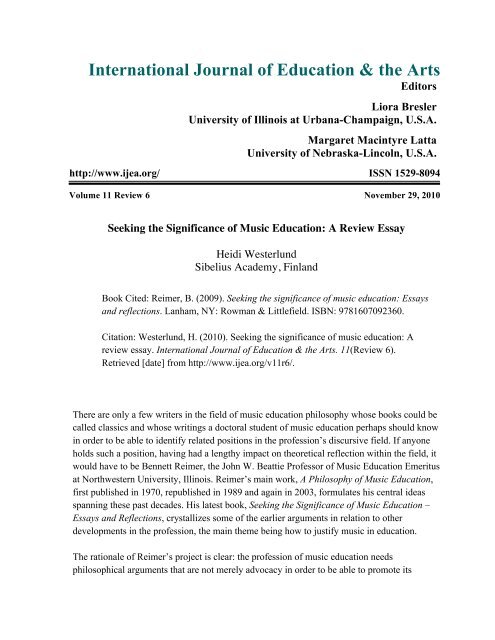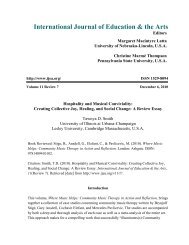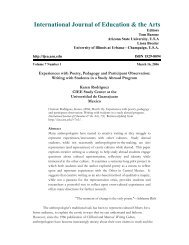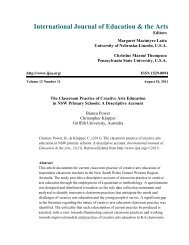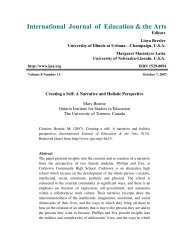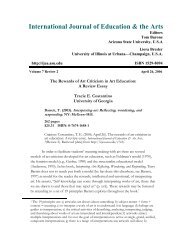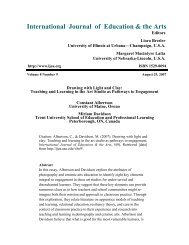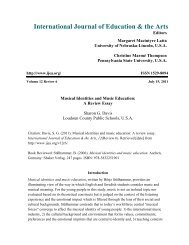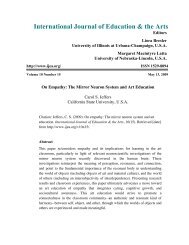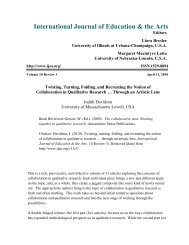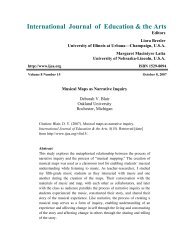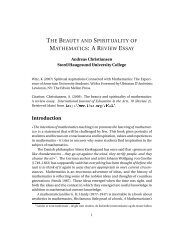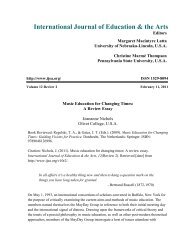This review essay is available in PDF format. - International Journal ...
This review essay is available in PDF format. - International Journal ...
This review essay is available in PDF format. - International Journal ...
You also want an ePaper? Increase the reach of your titles
YUMPU automatically turns print PDFs into web optimized ePapers that Google loves.
<strong>International</strong> <strong>Journal</strong> of Education & the Arts<br />
Editors<br />
Liora Bresler<br />
University of Ill<strong>in</strong>o<strong>is</strong> at Urbana-Champaign, U.S.A.<br />
Margaret Mac<strong>in</strong>tyre Latta<br />
University of Nebraska-L<strong>in</strong>coln, U.S.A.<br />
http://www.ijea.org/ ISSN 1529-8094<br />
Volume 11 Review 6 November 29, 2010<br />
Seek<strong>in</strong>g the Significance of Music Education: A Review Essay<br />
Heidi Westerlund<br />
Sibelius Academy, F<strong>in</strong>land<br />
Book Cited: Reimer, B. (2009). Seek<strong>in</strong>g the significance of music education: Essays<br />
and reflections. Lanham, NY: Rowman & Littlefield. ISBN: 9781607092360.<br />
Citation: Westerlund, H. (2010). Seek<strong>in</strong>g the significance of music education: A<br />
<strong>review</strong> <strong>essay</strong>. <strong>International</strong> <strong>Journal</strong> of Education & the Arts. 11(Review 6).<br />
Retrieved [date] from http://www.ijea.org/v11r6/.<br />
There are only a few writers <strong>in</strong> the field of music education philosophy whose books could be<br />
called classics and whose writ<strong>in</strong>gs a doctoral student of music education perhaps should know<br />
<strong>in</strong> order to be able to identify related positions <strong>in</strong> the profession’s d<strong>is</strong>cursive field. If anyone<br />
holds such a position, hav<strong>in</strong>g had a lengthy impact on theoretical reflection with<strong>in</strong> the field, it<br />
would have to be Bennett Reimer, the John W. Beattie Professor of Music Education Emeritus<br />
at Northwestern University, Ill<strong>in</strong>o<strong>is</strong>. Reimer’s ma<strong>in</strong> work, A Philosophy of Music Education,<br />
first publ<strong>is</strong>hed <strong>in</strong> 1970, republ<strong>is</strong>hed <strong>in</strong> 1989 and aga<strong>in</strong> <strong>in</strong> 2003, formulates h<strong>is</strong> central ideas<br />
spann<strong>in</strong>g these past decades. H<strong>is</strong> latest book, Seek<strong>in</strong>g the Significance of Music Education –<br />
Essays and Reflections, crystallizes some of the earlier arguments <strong>in</strong> relation to other<br />
developments <strong>in</strong> the profession, the ma<strong>in</strong> theme be<strong>in</strong>g how to justify music <strong>in</strong> education.<br />
The rationale of Reimer’s project <strong>is</strong> clear: the profession of music education needs<br />
philosophical arguments that are not merely advocacy <strong>in</strong> order to be able to promote its
IJEA Vol. 11 Review 6 - http://www.ijea.org/v11r6/ 2<br />
practices and to flour<strong>is</strong>h <strong>in</strong> present and future societies. Good practice follows from a solid<br />
theoretical rationale and th<strong>is</strong> rationale can be found <strong>in</strong> the academic field of aesthetics. A<br />
course <strong>in</strong> aesthetics <strong>in</strong> teacher education, for <strong>in</strong>stance, would give future teachers a proper idea<br />
of the values held <strong>in</strong> the field.<br />
Seek<strong>in</strong>g the Significance of Music Education cons<strong>is</strong>ts of 24 previously publ<strong>is</strong>hed articles from<br />
a variety of journals spann<strong>in</strong>g the past 50 years. In these articles, Reimer’s effort <strong>is</strong> focused on<br />
identify<strong>in</strong>g the core values of music, tak<strong>in</strong>g <strong>in</strong>to account larger societal and educational<br />
contexts (Part 1), <strong>in</strong> order to help music educators to deliberate between different claims<br />
concern<strong>in</strong>g not only why one should teach music, but also what to teach and how to teach<br />
(Part IIA), how to educate teachers (Part IIB) and what the role of research <strong>in</strong> the profession<br />
(Part IIC) ought to be. The last part of the book (Part III) looks towards the future and reflects<br />
upon societal changes. Throughout the book, Reimer expresses h<strong>is</strong> d<strong>is</strong>appo<strong>in</strong>tment <strong>in</strong> the<br />
naïve arguments commonly used <strong>in</strong> advocat<strong>in</strong>g music education. In h<strong>is</strong> view, even the more<br />
soph<strong>is</strong>ticated philosophical argumentation <strong>in</strong> the field of music education still predom<strong>in</strong>antly<br />
repeats what he sees as marg<strong>in</strong>al values when search<strong>in</strong>g for the significance of music and<br />
music education.<br />
The first of these m<strong>is</strong>guided arguments claims that the mak<strong>in</strong>g of music leads to sound and<br />
healthy bodies. Reimer’s counterargument simply recogn<strong>is</strong>es that there have been a<br />
significant number of sick composers <strong>in</strong> the h<strong>is</strong>tory of western culture, thus, mak<strong>in</strong>g music<br />
cannot necessarily <strong>in</strong>fluence one’s health <strong>in</strong> such a causal sense. Accord<strong>in</strong>g to the second<br />
claim, the mak<strong>in</strong>g of music promotes <strong>in</strong>ternational understand<strong>in</strong>g. Music, accord<strong>in</strong>g to<br />
Reimer, however lacks the communicative features of language, and therefore it does not<br />
seem rational to th<strong>in</strong>k that one could develop children <strong>in</strong>to comparative sociolog<strong>is</strong>ts through<br />
music. The third argument used to justify music education <strong>is</strong> that musical activity leads to<br />
democratic social relationships. Reimer’s tak<strong>in</strong>g a stance on th<strong>is</strong> claim dates back to the year<br />
1958 when the r<strong>is</strong>e of the civil rights movement and its related social tensions questioned old<br />
start<strong>in</strong>g po<strong>in</strong>ts. Reimer asks: “Can music education really resolve such deeply problematic<br />
<strong>is</strong>sues, someth<strong>in</strong>g no one seems to know how to do” (p. 6). Fourthly, Reimer identifies the<br />
argument that music promotes tranquillity and peace of m<strong>in</strong>d, go<strong>in</strong>g even further <strong>in</strong> argu<strong>in</strong>g<br />
that accord<strong>in</strong>g to th<strong>is</strong> claim one could then say that the greater the musician, the more tranquil<br />
and moral he <strong>is</strong>.<br />
Lastly, Reimer recogn<strong>is</strong>es that the dom<strong>in</strong>ant professional d<strong>is</strong>course elevates the social impact<br />
of music and, thus, the justification that music improves social competencies by stat<strong>in</strong>g, for<br />
<strong>in</strong>stance, that music gives a sense of achievement, affords opportunity for group participation,<br />
or develops <strong>in</strong>dividual self-sufficiency and cooperation. By deal<strong>in</strong>g with such “marg<strong>in</strong>al<br />
values” and by claim<strong>in</strong>g that these impacts achieved through music education are
Westerlund: Seek<strong>in</strong>g the Significance 3<br />
character<strong>is</strong>tic of music, educators severely mix music and teach<strong>in</strong>g, <strong>in</strong> fact it could be any<br />
teach<strong>in</strong>g <strong>in</strong> any other field, <strong>in</strong> th<strong>is</strong> way committ<strong>in</strong>g “a moral crime”. Writes Reimer, “It <strong>is</strong> for<br />
th<strong>is</strong> reason that it <strong>is</strong> of the utmost importance that any self-justification for music education be<br />
rid of the appurtenances which obscure and weaken its real import” (p. 11).<br />
Reimer’s own stance <strong>is</strong> clear: “It <strong>is</strong> with the depth of each <strong>in</strong>dividual’s personal experience<br />
with which art <strong>is</strong> concerned, and not, as <strong>is</strong> so commonly thought <strong>in</strong> art education, the<br />
horizontal relationships between person and person” (p. 12, writer’s emphas<strong>is</strong>). <strong>Th<strong>is</strong></strong> justifies<br />
art <strong>in</strong> our public schools and it <strong>is</strong> the task of music educators to provide opportunities for th<strong>is</strong>.<br />
A philosophy of music education, by explicat<strong>in</strong>g th<strong>is</strong> personal experience, lays the foundation<br />
for understand<strong>in</strong>g the power of music education as well as directs the dec<strong>is</strong>ions <strong>in</strong> practice: <strong>in</strong><br />
other worlds, philosophy gives the practice and the profession its needed boundaries of selfunderstand<strong>in</strong>g.<br />
It <strong>is</strong> not clear how much Reimer’s position <strong>is</strong> <strong>in</strong>fluenced by a certa<strong>in</strong> k<strong>in</strong>d of notion of<br />
experience or by the music education practices of the United States, however, the focus on<br />
personal experience demarcates h<strong>is</strong> position from current socio-cultural tendencies <strong>in</strong><br />
theoriz<strong>in</strong>g music education as well as from the critique towards classroom practices that do<br />
not take <strong>in</strong>to account the “real-world” social dimensions of music mak<strong>in</strong>g. Secondly, it can be<br />
argued – by us<strong>in</strong>g Reimer’s own counter argumentation – that many other subjects with<strong>in</strong> the<br />
school curriculum may also <strong>in</strong>fluence a student’s personal experience <strong>in</strong> a deep way. In that<br />
respect, what <strong>is</strong> after all special about music education Thirdly, <strong>in</strong> practice a teacher has to<br />
agree with the values that the school <strong>in</strong> general, <strong>in</strong> each particular context, expects from its<br />
teachers. For <strong>in</strong>stance, the F<strong>in</strong>n<strong>is</strong>h national curriculum base demands that every subject, also<br />
music, creates learn<strong>in</strong>g environments that are democratic and <strong>in</strong> which social values need to<br />
be taken <strong>in</strong>to account <strong>in</strong> all subjects. The personal emotional value of music needs to be<br />
comb<strong>in</strong>ed with other values, such as horizontal relationships between <strong>in</strong>dividuals. <strong>Th<strong>is</strong></strong> <strong>is</strong> to<br />
say that any other k<strong>in</strong>d of music educational practice would be at least educational<br />
malpractice, if not ill-legal. Aga<strong>in</strong>, Reimer argues that it <strong>is</strong> f<strong>in</strong>e to recogn<strong>is</strong>e these other values<br />
as long as the teacher does not confuse what <strong>is</strong> specifically musically valuable and what <strong>is</strong><br />
otherw<strong>is</strong>e educationally valuable; someth<strong>in</strong>g that any teacher could contribute. For Reimer,<br />
any other m<strong>in</strong>ority value should be subord<strong>in</strong>ated to musical value and th<strong>is</strong> pr<strong>in</strong>ciple should<br />
guide practice <strong>in</strong> schools and other educational places. <strong>Th<strong>is</strong></strong> means that, for example, social<br />
<strong>is</strong>sues are not taken as someth<strong>in</strong>g to be worked on, rather they just ex<strong>is</strong>t, or not; they just br<strong>in</strong>g<br />
quality to the musical situations, or not.<br />
S<strong>in</strong>ce Reimer’s <strong>in</strong>dividual<strong>is</strong>tic start<strong>in</strong>g po<strong>in</strong>t also implies certa<strong>in</strong> k<strong>in</strong>d of teach<strong>in</strong>g practices, it<br />
<strong>is</strong> worth consider<strong>in</strong>g it <strong>in</strong> more detail. We can ask, if we really can separate values <strong>in</strong> our<br />
experience. Imag<strong>in</strong>e a choir s<strong>in</strong>ger expla<strong>in</strong><strong>in</strong>g that she participates <strong>in</strong> the choir because it <strong>is</strong>
IJEA Vol. 11 Review 6 - http://www.ijea.org/v11r6/ 4<br />
fun and socially reward<strong>in</strong>g. A teacher could say that those values are m<strong>is</strong>guided and there<br />
should be a clear musical value-perspective <strong>in</strong>volved and that social values don’t count when<br />
justify<strong>in</strong>g the value of th<strong>is</strong> particular practice. The s<strong>in</strong>ger may understand that <strong>in</strong> part she s<strong>in</strong>gs<br />
<strong>in</strong> a choir because she loves s<strong>in</strong>g<strong>in</strong>g and music, but as long as the socially reward<strong>in</strong>g aspect <strong>is</strong><br />
lack<strong>in</strong>g she may start consider<strong>in</strong>g quitt<strong>in</strong>g the choir. She does not experience the musical<br />
aspect <strong>in</strong> <strong>is</strong>olation, but rather perceives musical events and enjoyment <strong>in</strong> relation to other<br />
experiential aspects, such as social relationships or hav<strong>in</strong>g fun. She could even argue that th<strong>is</strong><br />
comb<strong>in</strong>ation of values may be uniquely character<strong>is</strong>tique <strong>in</strong> th<strong>is</strong> particular hobby.<br />
An alternative position for theoriz<strong>in</strong>g experience would of course be one <strong>in</strong> which different<br />
values co-ex<strong>is</strong>t. Such a position has been articulated by John Dewey who argued that “apart<br />
from the needs of a particular situation <strong>in</strong> which choice has to be made, there <strong>is</strong> no such th<strong>in</strong>g<br />
as degrees or order of th<strong>in</strong>gs” (page 248 <strong>in</strong> Democracy and Education, Middle Works 9). In<br />
fact, he argues (with<strong>in</strong> h<strong>is</strong> overall <strong>in</strong>strumental value theory) that it <strong>is</strong> only <strong>in</strong>strumental values<br />
that require the question, what <strong>is</strong> it good for (p. 250). Accord<strong>in</strong>g to Dewey, the stubborn idea<br />
of educat<strong>in</strong>g specific faculties <strong>is</strong> repeated <strong>in</strong> the thought that different subjects represent<br />
specific values <strong>in</strong> the curriculum. <strong>Th<strong>is</strong></strong> idea <strong>is</strong> “the obverse side of the conception of<br />
experience or life as a patchwork of <strong>in</strong>dependent <strong>in</strong>terests” (p. 254).<br />
In h<strong>is</strong> book, Reimer argues that diverse experiences do matter when deliberat<strong>in</strong>g the whats<br />
and hows of teach<strong>in</strong>g music, and he urges the need for plurality with<strong>in</strong> the professional<br />
consensus. It <strong>is</strong> postmodern, or rather, “the post-postmodern” (p. 390) critique that demands<br />
that music education “democratize our ideas about music, to open them up to a more liberal<br />
view than we have tended to have” (p. 390). Our ontological beliefs of what matters <strong>in</strong> music<br />
should be critically re-exam<strong>in</strong>ed. Indeed, at least hypothetically th<strong>is</strong> means that if the African<br />
musician sees it as important that people connect with each other while mak<strong>in</strong>g music and<br />
experienc<strong>in</strong>g music, then that counts even if the approach used may be vastly different from<br />
that of our own.<br />
An important taken-for-granted aspect of Reimer’s stance <strong>is</strong> that it chooses aesthetics – and<br />
not for <strong>in</strong>stance education – as the highest d<strong>is</strong>cipl<strong>in</strong>ary field for provid<strong>in</strong>g self-understand<strong>in</strong>g<br />
for music education. One can question what makes western aestheticians higher <strong>in</strong> the<br />
hierarchy so that they, and they only, hold the answer that justifies the practice called music<br />
education, or def<strong>in</strong>es how music educators should understand their profession, and as<br />
Reimer’s logic goes, should give guidance for the practice What makes the view of an<br />
aesthetician more valid than that of the 19th century church representatives who decided that<br />
music should be <strong>in</strong>cluded <strong>in</strong> schools s<strong>in</strong>ce it cultivates Chr<strong>is</strong>tianity <strong>in</strong> people Or, what <strong>is</strong> the<br />
difference <strong>in</strong> relation to those early 20th century national<strong>is</strong>ts who claimed that music <strong>is</strong><br />
needed <strong>in</strong> schools to educate people <strong>in</strong>to lov<strong>in</strong>g their country through s<strong>in</strong>g<strong>in</strong>g. Besides which,
Westerlund: Seek<strong>in</strong>g the Significance 5<br />
aesthetics <strong>is</strong> not a d<strong>is</strong>cipl<strong>in</strong>e <strong>in</strong> which all academics agree on how music should be<br />
understood, they also do not agree on how personal experience <strong>is</strong> def<strong>in</strong>ed, or what <strong>is</strong> growth<br />
and education. One could therefore ask, should the philosophy of music education even be<br />
predom<strong>in</strong>antly <strong>in</strong>terested <strong>in</strong> f<strong>in</strong>d<strong>in</strong>g arguments for justification and, not least, can th<strong>is</strong> be done<br />
<strong>in</strong> the s<strong>in</strong>gular, as <strong>in</strong> a justification. There <strong>is</strong> after all no evidence of an absolute causal<br />
relationship between music, or good music, and deep personal experiences: the impact <strong>is</strong> a<br />
potential as are the effects that music can have on health and general wellbe<strong>in</strong>g.<br />
As I believe that philosophy <strong>is</strong> not about present<strong>in</strong>g truths and only truths, but <strong>is</strong> rather about<br />
ask<strong>in</strong>g questions, wonder<strong>in</strong>g, reflect<strong>in</strong>g, offer<strong>in</strong>g new angles and critic<strong>is</strong><strong>in</strong>g culture – <strong>in</strong> th<strong>is</strong><br />
case the culture of music education – Seek<strong>in</strong>g the Significance of Music Education fulfils its<br />
function <strong>in</strong> ra<strong>is</strong><strong>in</strong>g consciousness <strong>in</strong> terms of how the profession of music education def<strong>in</strong>es<br />
its very purpose. It gives <strong>in</strong>sight <strong>in</strong>to Bennett Reimer’s th<strong>in</strong>k<strong>in</strong>g even to those who never<br />
became acqua<strong>in</strong>ted with h<strong>is</strong> classic book.<br />
About the Reviewer<br />
Heidi Westerlund studied music education at the Sibelius Academy, F<strong>in</strong>land, complet<strong>in</strong>g also<br />
a Master’s degree <strong>in</strong> philosophy at the University of Hels<strong>in</strong>ki. She earned her Doctor of Music<br />
degree at the Sibelius Academy <strong>in</strong> scientific l<strong>in</strong>e. She <strong>is</strong> work<strong>in</strong>g as a professor at the Sibelius<br />
Academy responsible for doctoral studies <strong>in</strong> music education. She has served as a Co-chair of<br />
the <strong>International</strong> Society for Philosophy of Music Education and Vice-chair of the F<strong>in</strong>n<strong>is</strong>h<br />
Society for Research on Arts Education. She works for the <strong>International</strong> <strong>Journal</strong> of Music<br />
Education (research) and the Brit<strong>is</strong>h <strong>Journal</strong> of Music Education as a <strong>review</strong>er and she <strong>is</strong> the<br />
editor of the F<strong>in</strong>n<strong>is</strong>h <strong>Journal</strong> of Music Education. She has publ<strong>is</strong>hed mostly <strong>in</strong> the field of<br />
philosophy of music education.
<strong>International</strong> <strong>Journal</strong> of Education & the Arts<br />
Editors<br />
Margaret Mac<strong>in</strong>tyre Latta<br />
University of Nebraska-L<strong>in</strong>coln, U.S.A.<br />
Chr<strong>is</strong>t<strong>in</strong>e Marmé Thompson<br />
Pennsylvania State University, U.S.A.<br />
Manag<strong>in</strong>g Editors<br />
Alex Ruthmann<br />
University of Massachusetts Lowell, U.S.A.<br />
Matthew Thibeault<br />
University of Ill<strong>in</strong>o<strong>is</strong> at Urbana-Champaign, U.S.A.<br />
Associate Editors<br />
Jolyn Blank<br />
University of South Florida, U.S.A.<br />
Chee Hoo Lum<br />
Nanyang Technological University, S<strong>in</strong>gapore<br />
Editorial Board<br />
Peter F. Abbs<br />
Norman Denz<strong>in</strong><br />
Kieran Egan<br />
Elliot E<strong>is</strong>ner<br />
Magne Espeland<br />
Rita Irw<strong>in</strong><br />
Gary McPherson<br />
Julian Sefton-Green<br />
Robert E. Stake<br />
Susan St<strong>in</strong>son<br />
Graeme Sullivan<br />
Elizabeth (Beau) Valence<br />
Peter Webster<br />
University of Sussex, U.K.<br />
University of Ill<strong>in</strong>o<strong>is</strong> at Urbana-Champaign, U.S.A.<br />
Simon Fraser University, Canada<br />
Stanford University, U.S.A.<br />
Stord/Haugesund University College, Norway<br />
University of Brit<strong>is</strong>h Columbia, Canada<br />
University of Melbourne, Australia<br />
University of South Australia, Australia<br />
University of Ill<strong>in</strong>o<strong>is</strong> at Urbana-Champaign, U.S.A.<br />
University of North Carol<strong>in</strong>a—Greensboro , U.S.A.<br />
Teachers College, Columbia University, U.S.A.<br />
Indiana University, Bloom<strong>in</strong>gton, U.S.A.<br />
Northwestern University, U.S.A.


